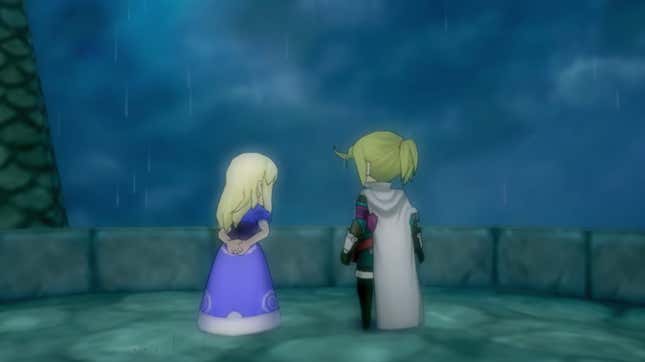
If there’s one thing Yoshitaka Murayama knows better than most people in the world, it’s how to bring Japanese role-playing games to life. While at Konami, he created the Suikoden series, and more recently did the scenario for The Alliance Alive. During the Tokyo Game Show, I sat down with Murayama and asked him how he writes JRPGs.
According to Murayama back when he created Suikoden, the plan was to do a gunzougeki or “an ensemble piece.”
“When I did my presentation at Konami, I said I wanted to do it like the Suikoden (the original Chinese novel), and the project got greenlit,” Murayama continued. The Suikoden series is based on the classic Chinese novel Shuihu Zhuan (the Water Margin), which is called Suikoden in Japan. “That’s how the game became Suikoden, the game.”
All of the different characters would provide plenty of fodder for the story.
“For me, I always put lots of emphasis on the story,” he said. “Since the time I created Suikoden and now, there isn’t much difference in how the story is created.” He still comes up with the tale he wants to tell the player, but acknowledges that the biggest changes have been how the characters are rendered in-game or how the use of cutscenes has increased.
But JRPGs are still massive, taking at least 40 hours (or way more) to play through. That’s a lot of a story, a lot of dialogue, and a lot of writing.
“It usually takes me about three months to come up with the plot,” Murayama said. “After that, we come up with a prototype, which takes about half a year. Then sitting down to actually write the words is another half a year. So, I’m working on it for about a year and a half.” His work is done before the actual game production begins.
When he sits down to create a JRPG, he first tries to figure out who each of the characters is. “For me, the story is how the characters progress. So, I need to think about what type of person is going to appear in the game. For The Alliance Alive, I needed to consider what each of these characters is thinking as well as the world in which they exist. As I was thinking about the character, I was thinking about the setting. Then, I would decide what they would do, what they wanted, and what they were thinking.”
By clearly defining the characters and the world, telling the story feels natural.
“To some extent, at the very beginning, a basic plot is decided,” Murayama explained. “In order to arrive at that point, I know we need to have certain things happen or certain scenes. However, within all of that, the characters have their own wants and desires, so as they come to life, they have freedom. If I just place them in a straight line, things will be boring. What I try to do is put the characters in situations that will get them to react in a particular way.”
Even though he lays things out, the process isn’t prescriptive. “Sometimes, I think that a character will probably react in a certain way. What I’m trying to get them to do is direct them towards a goal.”
Murayama’s process is organic. Because he thinks deeply about each character early in the process, he understands what they want and how they react. He has an idea of who they are. This helps him herd them naturally towards the climax. This is his strength as a storyteller.
“I have the big picture of where the characters need to go, but I don’t force them,” Murayama said. “Doing so would destroy them as characters. So what I try is how I can get them to get them headed in a particular direction. I think, for example, if I do something, then perhaps the character will react a certain way, and that brings the character to life.”
Unlike a novel, which involves the reader’s imagination, a game actively involves the player in the storytelling process. Surely that makes writing JRPGs difficult, I asked.
“I’ve done more than just writing,” Murayama replied. “Since the first Suikoden, I’ve worked as a director, so I’m aware of how much time players need to play, how much story they need, and how to balance that. I’ve been doing this for decades, so there are techniques involved. If you had never done this, writing an RPG might be difficult.”
In closing, I asked Murayama to define what he thought JRPGs were. “Japanese role-playing games are like bentos. You have all these different dishes you can enjoy in the bento box.” Then what would he compare Western RPGS to? “They’re like steak,” he replied, smiling and gesturing cutting a big hunk of meat.
The Alliance Alive HD Remastered, Murayama’s most recent JRPG saga, will be released on the Nintendo Switch next month.